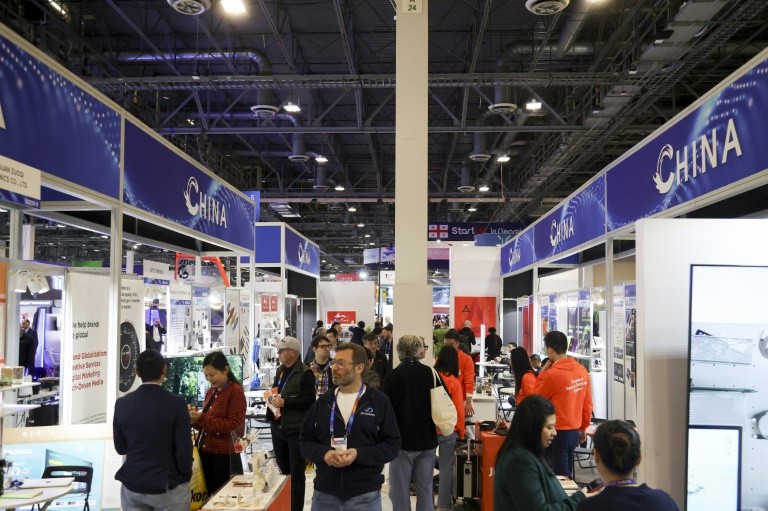
Chinese companies have turned out in force again at this year's Consumer Electronics Show, with their prospects overshadowed by the threat of steeper tariffs from incoming US president Donald Trump.
XPeng's "flying car" and TCL's AI-enhanced television were just a few of the products offered by Chinese companies that have won attention at CES, the annual Las Vegas tech confab.
The potential for Trump's trade policies to roil the global tech industry has loomed large over the event.
Trump campaigned on a threat to impose 60 percent tariffs on Chinese goods, and has reinterated a hardline stance since winning the November election.
Analysts view the threat as at least partly a negotiating tactic, but note that Trump's first term included a bruising trade war with Beijing, including tariffs that were maintained and enhanced during President Joe Biden's tenure.
Chinese companies expressed varying levels of concern about the threat.
"We are worried about Trump's government policy, but we think it might not last long," said Mekia Yang of startup Jitlife, which makes its "smart" suitcases in Guangdong Province.
"Trump might act tough at the beginning, and then he might change, because there will be some pressure from domestic markets," due to rising prices, she said.
Zhanbin Ao of Mammotion Technology Co., which sells autonomous lawnmowers, acknowledged unease about new levies but said the company is currently shifting production to Thailand, Vietnam and other Asian countries.
"So once we move our manufacturing to other countries, a tariff is not an issue for us," he said.
Other Chinese companies brushed off the threat.
Haojia Dengyang of Shenzhen Haoqitansuo Technology, predicted its products would attract US customers even with new tariffs "because they're valuable, they can really help people."
Shenzhen Haoqitansuo sells smartphone cases, charging devices and other products under the Torras brand in the United States.
At a November CES press preview held after the election, organizers took a diplomatic line on politics.
Gary Shapiro, president of CES organizer the Consumer Technology Association, expressed hope Trump would pivot from the aggressive antitrust posture of the Biden administration that he likened to "death by a million cuts."
But Shapiro also railed against tariffs, saying they amounted to a tax on consumers.
Trump's threatened 60 percent levy on Chinese goods "would be devastating," Shapiro said.
China and other targeted markets "are going to hit back on us, so our exports will be affected as well," he said. "This is not good for the country."
"We need a future of strong trade ties with our friends and allies around the world. In today's world, no country can go it alone...we must avoid unnecessary tariffs," Shapiro later said at an industry dinner Wednesday.
Like their Chinese counterparts, US companies at CES have steered away from political discussion at product launch events.
But executives told AFP the issue is top of mind, even if they aren't sure exactly what to expect.
John Pfeifer, CEO of Oshkosh, said most of the industrial company's goods sold in the United States are made within the country's borders, but a fraction are imported.
"If they do a 20 percent blanket tariff on anything coming into the US, that would have an impact on us," he said, pointing to operations in Europe, Mexico and India.
"We'd have to decide, okay, what to do -- to either reshore this or reengineer so that we can get a different supply base to avoid that tariff."
Oshkosh might also resort to price hikes if tariffs lift prices of critical parts or materials imported to US plants, Pfeifer said.
Like Oshkosh, US agricultural giant John Deere manufactures the vast majority of its equipment sold in the United States within the country's borders.
"It's a little early to tell what the tariff situation would be, but we've navigated through this in the past," said Deanna Kovar, president, Worldwide Agriculture & Turf Division at Deere.
She described the impact on Deere's products as secondary to the concerns about retaliatory tariffs.
"Our biggest concern is to make sure our customers have markets for their products -- the corn, the soybeans, the pistachios and almonds that they grow and that there aren't retaliatory tariffs," she said.
"The most important thing is our customers and that their businesses are viable in the long run," she said.








